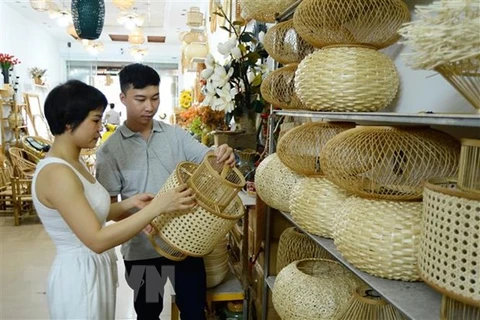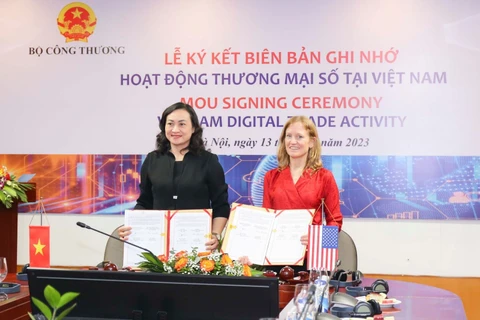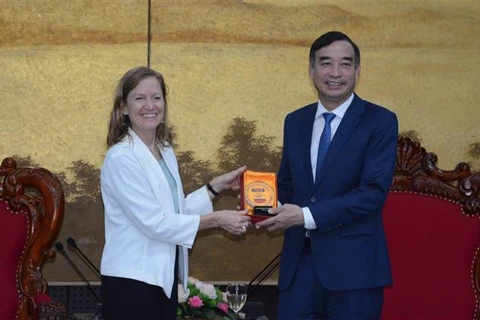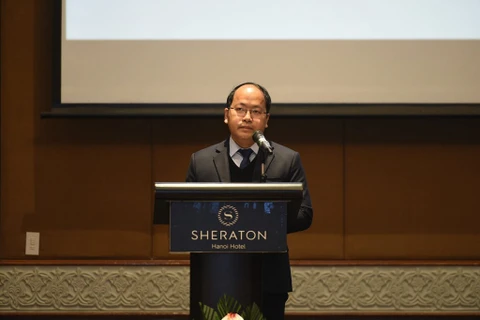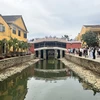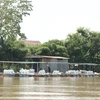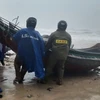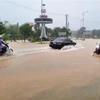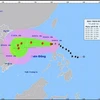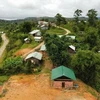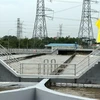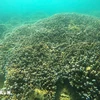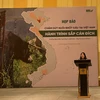Kien Giang (VNA) – A project funded by the US Agency for International Development (USAID) to conserve coastal habitat in the Mekong Delta region was launched at a ceremony in Kien Giang on March 15.
The event was jointly organised by the mission of the US Embassy in Vietnam, through USAID, the leadership of the Directorate of Fisheries under the Ministry of Agriculture and Rural Development (MARD), local authorities in the Mekong Delta region, the International Union for the Conservation of Nature (IUCN), and the World Wide Fund for Nature in Vietnam (WWF Vietnam).
Addressing the event, Tran Dinh Luan, General Director of the Department of Fisheries, underlined the orientation to develop the fisheries sector towards market-driven approaches; environmental friendliness; protection, regeneration, and sustainable development of fisheries resources; biodiversity conservation; and climate change adaptation.
The project aims to protect important coastal ecosystems in Mekong Delta, focusing on activities in Kien Giang and Soc Trang provinces, to address challenges and enhance the effectiveness of marine resources management, thus improving resilience to climate change and conserving biodiversity.
The Mekong Delta and its coastal ecosystems are home to 70% of Vietnam’s mangroves and 90% of its seagrass beds. Fed by the sediment and nutrients from the Mekong River, these habitats support Vietnam’s richest fishing grounds, create livelihoods for coastal communities and provide crucial protection for them from natural disasters.
However, they and many commercially important species are under growing threats, causing long-term impacts on livelihoods and the lives of the local population. Coastal areas in Vietnam are also facing pressure from overexploitation and unplanned development.
The project is expected to strengthen the management of marine resources to reduce illegal, unreported and unregulated fishing activities, and conserve and expand coastal and marine biodiversity of the Mekong Delta, which will also strengthen the coastal resilience of local communities.
With a total budget of 2.9 million USD, the project will concentrate on reducing threats to coastal biodiversity and fisheries, and strengthening coastal resilience in the Mekong Delta, in partnership with the Vietnamese Government, local authorities, businesses, management boards of marine protected areas, development partners, and fishing communities.
According to Director of USAID Vietnam Aler Grubbs, the project is expected to advance the shared priorities of USAID and Vietnam in strengthening resilience to climate change in the Mekong Delta region, which plays a crucial role but is increasingly vulnerable to threats; and contribute to the Vietnam – US Comprehensive strategic partnership.
Dr. Andrew Wyatt, Director of the project and Deputy Head of IUCN Lower Mekong Sub-region, stated that the project will pilot measures to conserve and restore natural resources in the region, then scaling up nationwide. Through the project, USAID will support Vietnam in restoring and conserving biodiversity in coastal areas, enhancing marine resource management towards sustainable fisheries development./.
The event was jointly organised by the mission of the US Embassy in Vietnam, through USAID, the leadership of the Directorate of Fisheries under the Ministry of Agriculture and Rural Development (MARD), local authorities in the Mekong Delta region, the International Union for the Conservation of Nature (IUCN), and the World Wide Fund for Nature in Vietnam (WWF Vietnam).
Addressing the event, Tran Dinh Luan, General Director of the Department of Fisheries, underlined the orientation to develop the fisheries sector towards market-driven approaches; environmental friendliness; protection, regeneration, and sustainable development of fisheries resources; biodiversity conservation; and climate change adaptation.
The project aims to protect important coastal ecosystems in Mekong Delta, focusing on activities in Kien Giang and Soc Trang provinces, to address challenges and enhance the effectiveness of marine resources management, thus improving resilience to climate change and conserving biodiversity.
The Mekong Delta and its coastal ecosystems are home to 70% of Vietnam’s mangroves and 90% of its seagrass beds. Fed by the sediment and nutrients from the Mekong River, these habitats support Vietnam’s richest fishing grounds, create livelihoods for coastal communities and provide crucial protection for them from natural disasters.
However, they and many commercially important species are under growing threats, causing long-term impacts on livelihoods and the lives of the local population. Coastal areas in Vietnam are also facing pressure from overexploitation and unplanned development.
The project is expected to strengthen the management of marine resources to reduce illegal, unreported and unregulated fishing activities, and conserve and expand coastal and marine biodiversity of the Mekong Delta, which will also strengthen the coastal resilience of local communities.
With a total budget of 2.9 million USD, the project will concentrate on reducing threats to coastal biodiversity and fisheries, and strengthening coastal resilience in the Mekong Delta, in partnership with the Vietnamese Government, local authorities, businesses, management boards of marine protected areas, development partners, and fishing communities.
According to Director of USAID Vietnam Aler Grubbs, the project is expected to advance the shared priorities of USAID and Vietnam in strengthening resilience to climate change in the Mekong Delta region, which plays a crucial role but is increasingly vulnerable to threats; and contribute to the Vietnam – US Comprehensive strategic partnership.
Dr. Andrew Wyatt, Director of the project and Deputy Head of IUCN Lower Mekong Sub-region, stated that the project will pilot measures to conserve and restore natural resources in the region, then scaling up nationwide. Through the project, USAID will support Vietnam in restoring and conserving biodiversity in coastal areas, enhancing marine resource management towards sustainable fisheries development./.
VNA

